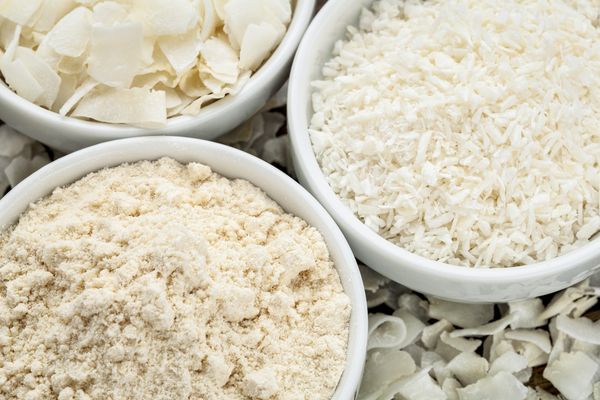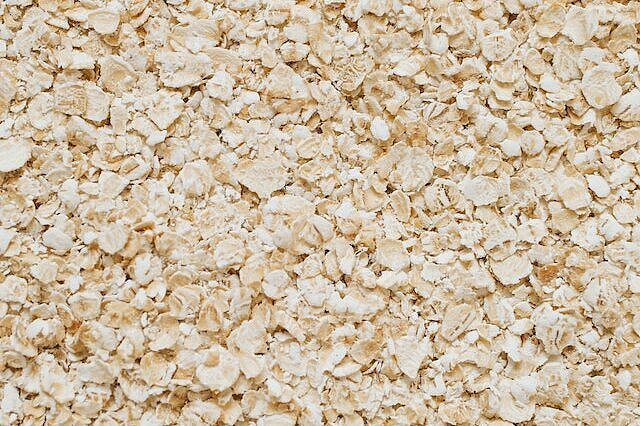Almond flour

What is almond flour?
Almond flour is a flour made from blanched and peeled almonds. The almonds are ground into a fine powder that is ideal for baking. Almond flour has a high content of protein, fiber, healthy fats, vitamin E and magnesium. It is gluten-free and low in carbohydrates, making it a good choice for people with coeliac disease, diabetes or on a ketogenic diet.
Is almond flour toxic for dogs?
No, almond flour is not toxic to dogs. It does not contain any substances that are harmful to dogs, such as xylitol, chocolate or raisins. However, this does not mean that almond flour is well tolerated by all dogs. Some dogs can react sensitively to almonds and develop gastrointestinal complaints such as vomiting, diarrhea or loss of appetite. In addition, a high consumption of almond meal can lead to obesity or pancreatitis, as it is very high in calories and fat.
What are the benefits of almond meal for dogs?
Almond meal can have some benefits for dogs when fed in moderation. For example, it can help stabilize blood sugar levels as it is low in carbohydrates. It can also promote skin and coat health as it is rich in vitamin E and omega-3 fatty acids. It can also be a good alternative to grain flours if your dog has a grain allergy or intolerance.
What are the disadvantages of almond meal for dogs?
Almond meal also has some disadvantages for dogs that you should be aware of. For one thing, it can lead to digestive problems if your dog doesn't tolerate it well or eats too much of it. Secondly, it can contribute to obesity or pancreatitis if fed too often or in large quantities. It can also be more expensive than other types of flour and harder to find.
How much almond meal can my dog eat?
There is no exact specification of how much almond meal your dog can eat. It depends on various factors, such as your dog's weight, size, age and health. In general, you should only use almond meal as an occasional treat or ingredient in homemade treats and not as a main part of your dog's diet. A rule of thumb is that your dog should not get more than 10 percent of his daily calories from treats.
How can I feed my dog almond meal?
If you want to feed your dog almond meal, there are several ways you can do this. One option is to give him some of your own cookies with almond flour, as long as they don't contain any other harmful ingredients. However, make sure you only give him a small piece and watch his reaction to it.
Another option is to bake him homemade treats with almond flour. For example, you can mix almond flour with eggs, bananas, peanut butter or other dog-friendly ingredients and form them into cookies or muffins. You can also combine almond flour with other types of flour, such as coconut flour, rice flour or oat flour, to vary the nutrients and texture. You can find many recipes for dog cookies with almond flour on the internet or in books.
Almond flour is a gluten-free and low-carbohydrate flour made from ground almonds. It is not toxic to dogs, but it is not well tolerated by all dogs. It can have some benefits for your dog's health, but also some disadvantages if fed too much or too often. If you want to feed your dog almond meal, you should only use it as an occasional treat or ingredient in homemade treats and adjust the amount and frequency. Also, always monitor your dog's reaction to it.
If you notice any signs of hypersensitivity or poisoning in your dog, you should see your vet immediately. We are not a substitute for a vet, but we try to be as accurate as possible. Every dog reacts differently and we recommend you get a second opinion or consult your vet if in doubt.
Stay healthy and take good care of your four-legged friend!😊
Similar to Almond flour
Coconut flour is a by-product of coconut oil production. After the coconut meat has been pressed to extract the oil, a dry and fibrous residue remains. This is then ground into a fine flour that has...
Walnut flour is made from ground walnuts after they have been stripped of most of their oil. The result is a light, nutty-tasting flour that is rich in protein and fiber. It is often used in...
Chickpea flour, also known as gram flour or besan, is made from ground chickpeas. These legumes are known for their high content of protein, fiber and various nutrients, including iron, phosphorus...
Oatmeal has several benefits for dogs that make it a good choice for breakfast or as an ingredient in homemade dog treats. Here are some of them: Oatmeal is gluten-free and is therefore well...



